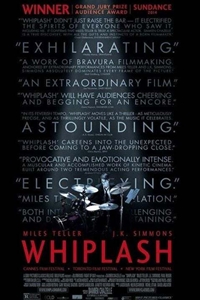Whiplash (R) ★★★★½
 A basic command of rhythm will make your film watchable; kinetic proficiency will make it dramatically effective. But the aural language instituted by Damien Chazelle in his second directorial feature, Whiplash, lands you with a goddamn symphony.
A basic command of rhythm will make your film watchable; kinetic proficiency will make it dramatically effective. But the aural language instituted by Damien Chazelle in his second directorial feature, Whiplash, lands you with a goddamn symphony.
Chazelle constructs what might wind up being one of the great music movies of all time, conducting each tier of his film with an active ear. Whiplash opens with a literal drum solo - courtesy of driven Schaffer Academy student Andrew (Miles Teller) - setting precedent for a collection of tremendous jazz numbers to follow throughout. Immediately afterward, we watch Chazelle weave scenes together via the harmonies of brass, building an atmosphere that he molds and contorts as the picture progresses.
But the most impressive symphonic feat is that which follows Andrew's chaotic run toward a stature as jazz prodigy, and the tutelage, camaraderie, and enmity he earns from his no-nonsense-is-putting-it-lightly teacher Mr. Fletcher (J.K. Simmons, playing the gruffest, fieriest, most intimidating role yet in a career that has tossed him no shortage of opportunities of the like).
Andrew's story unravels, ribbons out, leaps, explodes, and recollects at such an absolutely delightful pace. Character beats are inset with such expert timing, that we occasionally get the rush of watching a live performance. Ultimately, Andrew's story breathes and moves like a song - a jazz number, naturally - which renders every turn, reveal, and twist of perspective a tremendous showstopper.
And what it has to say about music? Everything that jazz might entail: how beautiful it is to love the art so wholly, and how toxic and destructive it is to devote yourself entirely to its whims. Whiplash doesn't shove us to either side of favor regarding either of its central heroes/villains (they are equal parts each, and merrily so), nor to either side of the dividing line on whether succumbing altogether to the corrosive call of the drumsticks is, to put it reductively, a "good idea." With such gratitude we can affirm that the movie doesn't want to teach us a lesson. It just wants to play us a song.
To get the full Quicklook Films experience, uncheck "Enable on this Site" from Adblock Plus
box office top 10

Civil War Released: April 12, 2024 Cast: Kirsten Dunst, Wagner Moura 11.1M

Abigail Released: April 19, 2024 Cast: Melissa Barrera, Dan Stevens 10.2M

Godzilla x Kong: The New Empire Released: March 29, 2024 Cast: Rebecca Hall, Brian Tyree Henry 9.5M

The Ministry of Ungentlemanly Warfare Released: April 19, 2024 Cast: Henry Cavill, Eiza Gonzalez 9M

Spy x Family Code: White Released: April 19, 2024 Cast: Takuya Eguchi, Saori Hayami 4.9M

Kung Fu Panda 4 Released: March 8, 2024 Cast: Jack Black, Viola Davis 4.6M

Ghostbusters: Frozen Empire Released: March 22, 2024 Cast: Paul Rudd, Carrie Coon 4.4M

Dune: Part Two Released: March 1, 2024 Cast: Timothée Chalamet, Rebecca Ferguson 2.9M

Monkey Man Released: April 5, 2024 Cast: Dev Patel, Sikandar Kher 2.2M

The First Omen Released: April 5, 2024 Cast: Nell Tiger Free, Bill Nighy 1.7M






